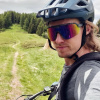Royal Mont Blanc Ascent
Itinerary
-
Day 1 Meeting and first day's training in snow and ice climbing on Glacier du Tour
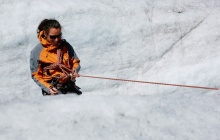 We meet the guide and discuss the trip with him. He will also check our personal equipment (possible rent). We then travel to the village of Le Tour by car, and take a small two-stage cable-car to Col de Balme, where we begin our walk to the Albert Premier refuge (2702m, on Glacier du Tour). Here we spend the afternoon training in snow and ice climbing on the glacier.
We meet the guide and discuss the trip with him. He will also check our personal equipment (possible rent). We then travel to the village of Le Tour by car, and take a small two-stage cable-car to Col de Balme, where we begin our walk to the Albert Premier refuge (2702m, on Glacier du Tour). Here we spend the afternoon training in snow and ice climbing on the glacier.
Walking hours : 4h to 5h
Positive difference in altitude : about 500m
Altitude Max : 2702m
Accommodation : evening meal and night in the Albert Premier refuge. -
Day 2 Tête Blanche (3429 m) ascent
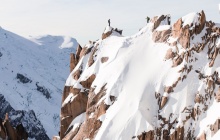 We ascend from the refuge to make an attempt on Tête Blanche (3429m) and reach the Trient refuge through the Col supérieur du Tour.
We ascend from the refuge to make an attempt on Tête Blanche (3429m) and reach the Trient refuge through the Col supérieur du Tour.
Walking hours : 6h to 7h
Positive difference in altitude : about 850m
Negative difference in altitude : about 850m
Max Altitude : 3429m
Accommodation : evening meal and night in the Trient refuge. -
Day 3 Col Superieur du Tour
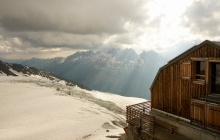 Starting from the Trient refuge, we climb the Col Supérieur du Tour. We then descend, passing en route the Albert Premier refuge (little break), back to the village of Le Tour.
Starting from the Trient refuge, we climb the Col Supérieur du Tour. We then descend, passing en route the Albert Premier refuge (little break), back to the village of Le Tour.
At the gite of the Club Alpin of the village of the Tour where we will be lodged,, the guide brings you to inform you of the result of the program according to weather forecasts and conditions of the mountain. He will also form the duets for the ascent of Mont Blanc.Walking hours : 6h to 7h
Positive difference in altitude : about 400m
Negative difference in altitude : about 1000m
Max Altitude : 3235m
Accommodation : evening meal and night in Chamonix. -
Day 4 Mont Blanc railway to Nid d'Aigle, and walk to the Tête Rousse refuge (3167m).
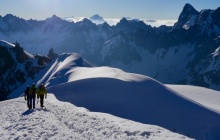 This is the first step of the Mont Blanc ascent and it is quite easy. We start from Les Houches with our reinforcement guides, where we take the Bellevue cable-car to reach the Bellevue train station where we catch the Victorian Rack railway train ("Tramway du Mont Blanc") to Nid d'Aigle (2372 m).
This is the first step of the Mont Blanc ascent and it is quite easy. We start from Les Houches with our reinforcement guides, where we take the Bellevue cable-car to reach the Bellevue train station where we catch the Victorian Rack railway train ("Tramway du Mont Blanc") to Nid d'Aigle (2372 m).
From there we walk up a winding track offering a stuning view over Chamonix valley. After a quick moment walking on North face, we arrive on a snow-covered area landing to the brand new Tête Rousse refuge (3167 m). We spend the whole afternoon relaxing, acclimatising, and contemplating the wonderful sight on Aiguille de Bionnassay's North face.Walking hours : 3h to 4h
Positive difference in altitude : about 800m
Altitude Max : 3167m
Accommodation : evening meal and night in the Tête Rousse refuge. -
Day 5 Goûter refuge
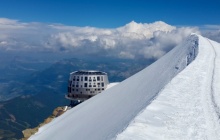 This climb is through the rocky slopes of the Aiguille du Gouter. A wide corridor in the lower slope is exposed to rockfall and it is very important to follow the instructions of the guide. The rest of the rise is effected by a bit marked spur and some passages are equipped with cables or cords, and require the use of hands. The refuge is a great viewpoint of the surrounding mountains.
This climb is through the rocky slopes of the Aiguille du Gouter. A wide corridor in the lower slope is exposed to rockfall and it is very important to follow the instructions of the guide. The rest of the rise is effected by a bit marked spur and some passages are equipped with cables or cords, and require the use of hands. The refuge is a great viewpoint of the surrounding mountains.
Note: in case of bad weather announced for the next day it will be possible to directly mount that day summit of Mont Blanc. The guides will make the decision, depending on the conditions and the level of participants.Walking hours : 3h to 4h
Positive difference in altitude : about 00m
Altitude Max : 3835m
Accommodation : evening meal and night in the Goûter refuge. -
Day 6 Mont Blanc ascent
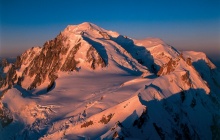 Wake up at 2 hours, breakfast and departure: we head to the Dome of Goûter. We are moving to the front, the slopes are gentle and you have to take a calm and steady pace. The night the notion of time disappears and we soon reach the Dome of Goûter 4304 m. The day arrives and we are Vallot refuge-bivouac, which is not kept and theoretically shelter serves to climbers in trouble. This is often where the sun joins us and with it a brand new place. The summit nears, the Bosses ridge begins, and for a few hours we will be between earth and sky on a beautiful ridge and sometimes air. The guide will ask you to ensure that the rope is taut. Finally, after a final bump, ridge widens and the top appears large and welcoming. Welcome to 4810 m!
Wake up at 2 hours, breakfast and departure: we head to the Dome of Goûter. We are moving to the front, the slopes are gentle and you have to take a calm and steady pace. The night the notion of time disappears and we soon reach the Dome of Goûter 4304 m. The day arrives and we are Vallot refuge-bivouac, which is not kept and theoretically shelter serves to climbers in trouble. This is often where the sun joins us and with it a brand new place. The summit nears, the Bosses ridge begins, and for a few hours we will be between earth and sky on a beautiful ridge and sometimes air. The guide will ask you to ensure that the rope is taut. Finally, after a final bump, ridge widens and the top appears large and welcoming. Welcome to 4810 m!
The descent is via the same route to the Nid d'Aigle where we go in the Tramway du Mont Blanc. A final round of cable and here we are in Les Houches.Walking hours : 10h to 12h
Positive difference in altitude : about 1000m
Negative difference in altitude : about 2400m
Altitude Max : 4810m
Dates & prices
Departures for French-speaking groups:
| From | To | Price per person | Guaranteed | Booking |
|---|---|---|---|---|
| €2,699 | Yes | Fully booked | ||
| €2,699 | Yes | Fully booked | ||
| €2,699 | Yes | Fully booked | ||
| €2,699 | Yes | Fully booked | ||
| €2,699 | Yes | Fully booked | ||
| €2,699 | Yes | Fully booked | ||
| €2,699 | Yes | Fully booked | ||
| €2,699 | Yes | Fully booked | ||
| €2,699 | Yes | Fully booked | ||
| €2,699 | Yes | Fully booked | ||
| €2,699 | Yes | Fully booked | ||
| €2,699 | Yes | Book now! | ||
| €2,699 | Yes | Fully booked | ||
| €2,699 | Yes | Fully booked | ||
| €2,699 | Yes | Fully booked | ||
| €2,700 | Yes | Fully booked | ||
| €2,700 | Yes | Book now! | ||
| €2,899 | No | Book now! | ||
| €2,999 | Yes | Book now! | ||
| €2,789 | No | Book now! | ||
| €2,789 | No | Book now! | ||
| €2,789 | No | Book now! | ||
| €2,789 | No | Book now! | ||
| €2,789 | No | Book now! | ||
| €2,789 | No | Book now! | ||
| €2,789 | No | Book now! | ||
| €2,789 | No | Book now! | ||
| €2,789 | No | Book now! | ||
| €2,789 | No | Book now! | ||
| €2,789 | No | Book now! | ||
| €2,789 | No | Book now! |
International departures:
No departure for now
Trip code: ADMB
Included
- The technical organisation of the trip
- A high mountain guide's supervision : 1 guide for the group during training and 1 guide for 2 people during the ascent
- Accommodation in a 3-star hotel on day 3 : Chalet Hotel Le Prieuré in Chamonix
- Cable cars and movements necessary to the normal progress of the program
- Accommodation in refuges half-board
- Lunch picnics during the 6 days of the trip
- Minibus transfers in the valley
- Collective equipment (ropes)
Not included
- Individual technical equipment
- Registration fees
- Drinks & personal expenses
- Snacks (cereal bars, dried fruits, chocolate bars, etc.) according to your own convenience
- Insurance/assistance : cancellation, research and rescue by helicopter in high mountain (in France, Italy and Switzerland) hospitalization and repatriation
- Travel expenses to the meeting point and dispersion point
- Dinner on day 3
- Everything that isn't mentioned in the "included" section
Notes
International flights
Terms and conditions
Booking conditions
Invoice procedure
Cancellation policy
- Cancellation received more than 30 days prior to the departure date: a sum of €50 per person will be retained
- Cancellation received 30 to 21 days before the departure date: your deposit, 30% of the total trip price will be retained
- Cancellation received 20 to 14 days before the departure date: 50% of the total trip price will be retained
- Cancellation received 13 to 7 days before the departure date: 75% of the total trip price will be retained
- Cancellation received less than 7 days before the departure date: 100% of the total trip price will be retained
- Fixed airfares: if your airline ticket was issued in advance, often done to avoid significant surcharges, you will be charged 100% of any non-refundable fees if you wish to change or cancel your flight plan.
- Fixed in-country costs: early charges for firm bookings will be charged if you cancel or modify your trip.
- Insurance costs: if you have taken out comprehensive or cancellation insurance, the cost of insurance is due and cannot be refunded.
Changes to travel contract
Pricing
Contract transfer
Insurance
Practical info
Staff
Food
- Lunch picnics
- Diners : meals prepared by shelter keepers
- Take some race food according to your own tastes (cereals bars, chocolate bars, dry fruits,…). You can buy some in Champex village if you need.
- Water is not for free in refuges (from 5 to 8 euros one bottle). We advise you to bring some water purification tablets (Aquatabs or Micropur) in order to drink tap water.
- Personal drinks are not included in the trip's price
- Bring some Swiss francs for coffees, fruit juices, coke or beers during breaks… Shelters usually don’t accept bank card payments and Euros.
Accommodation
Transportation
Budget & exchange
Tips
Supplied equipment
- Collective equipment (ropes, compass ...)
- Slippers while in huts
Material
- Mountaineering boots that you can fit crampons onto (with rigid soles)
- A comfortable mountaineering backpack (40/45L)
- Ice axe, crampons, harness with locking carabiner, helmet
- One or two collapsible walking poles (depending on what you are used to)
- A water bottle (1.5L )
- A warm hat
- A sun hat and/or a scarf
- Sun glasses for glacier, cat. 4 sun protection that are closing well on the sides + ski goggle
- A pair of warm gloves or mittens
- A pair of fleece or wool gloves or mittens
- A pair of silk gloves or mittens
- 2 or 3 breathable undershirts, preferably long sleeves (e.g. Capilene or polypro)
- Fleece or heavy jacket
- Down jacket (optional but highly appreciated the summit day if the weather is very cold)
- Wind and waterproof shell jacket with hood (Gore Tex or similar)
- A pair of comfortable mountaineering pants
- Wind and waterproof over pants (Gore Tex or similar)
- Long underwear or running tights (e.g. Capilene or polypro)
- 2 pairs of socks : a warm one and a lighter one- gaiters- light-weight sleeping bag liner, preferably silk (wool covers are provided by the hut)
- Toiletries : only tooth-brush and tooth-paste- sun cream (face and lips)
- A head lamp with spare batteries and bulb
- Pocket knife
- A rain cover for your backpack (optional)
Luggage
- During the training and the climb, you will carry our own personal equipment and packed lunches in your backpack (40-45L)
- The rest of your luggage will stay in Chamonix and can be kept in another bag (travel bag)
Medicine
- Personal medication
- Pain killers (preferably Paracetamol)
- Double skin
- Elastoplast (excellent to prevent blisters)
- Bandages
- Disinfectant
- Anti-inflammatory
- Antispasmodic
- Anti-diarrheal
- Anti-vomiting
- Intestinal antiseptic
- Eye drops
- Light sleeping pills
- Ear plugs
Passport
Visa
- Up to 90 days visit in France : citizens from most countries do not need a visa to visit France.
- Over 90 days visit in France : non-EU or non-EFTA citizens must have a visa to visit France over 90 days.
Identity card
Mandatory vaccines
Health information & recommendations
Weather
Electricity
Local time
Sustainable tourism
- Most of our accommodations are run by locals, thus ensuring that the largest part of the revenue generated through your trip will stay within the region.
- France is known for its exquisite cuisine. The art of cooking and the joy of eating are part of everyday life. Each region has its particular foods and flavors which we would like you to explore and appreciate.
- Water is a precious and rare good. Our team and those travelling with us are thus advised to use it with consideration and avoid excessive water use where possible.
- Please try to recycle your waste whenever possible, even though recycling may not be a well-known concept in all areas.
- Be cautious and respectful when hiking. Make sure to wear suitable footwear and avoid picking flowers, moving stones or lighting fires.


